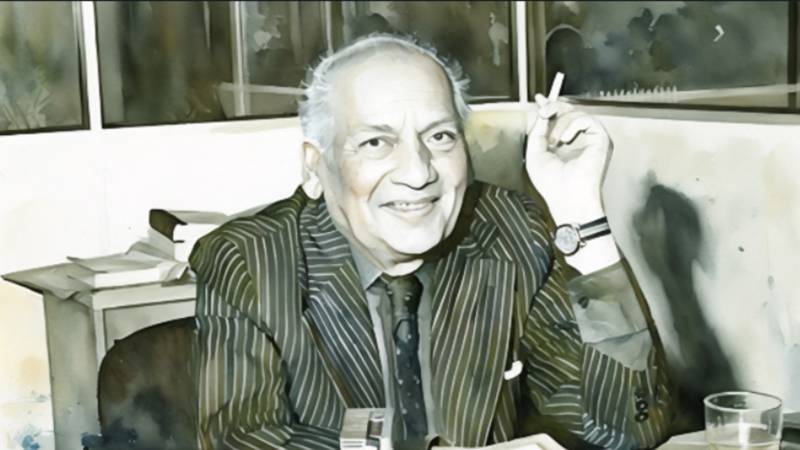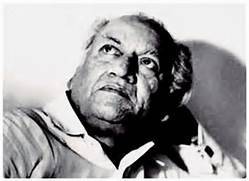
I have felt all my life that Faiz was such a multifaceted person that looking at him just as a poet extraordinaire does not do justice to his persona. This is what inspired me to try and cover another aspect of Faiz, which is relatively unspoken and even less written about, as his 40th death anniversary draws close.
Despite Faiz’s full-time commitment to progressive writing, socialistic ideals and classical poetry, together with his journalistic career, he somehow still found time to flirt with films in some way. His strong belief in the power of cinema, which he felt could be exploited to share a strong message across a wider audience, kept him connected. He played an integral role in two films during the early decades of Pakistan’s emerging film industry.
Until the award-winning Jago Hua Savera, the first Urdu film made in EP/Bangladesh, produced by Nauman Taseer and directed by AJ Kardar, was screened at Cannes Film Festival, it had received little recognition. The film was released in May 1959, and Faiz wrote the script, lyrics and dialogues of this film. It was also the first ever Pakistani film submitted for Oscar nomination, also winning the Golden Award at the Moscow International Film Festival. The second film Sukh ka Sapna, directed by the brilliant cameraman and director Masood Parvez, was released in January 1962. In Sukh ka Sapna, Madam Noor Jehan’s numbers “Shaam hui ghar aaja” and “Hum tere paas aaey sarey sitam bhula ke” were penned by Faiz.
Later, due to Faiz’s ideological stance, he was unable to connect himself too closely with the film industry, as he was time and again banned in the media and he found it hard to maintain his momentum with film lyrics. However, filmmakers continued to take his soul-stirring nazms and ghazals for their films. His poetic lines have inspired the leading phrases of numerous memorable songs like “Aaj ki raat saz-e-dil pur dard na chhed,” which was sung by Noor Jehan for the Indian film Jugnu. After partition, the famous Indian film Mehal contained Faiz’s “Donon jahan teri mohabbat main haar ke.”

In Pakistan, when director Khalil Qaiser and Riaz Shahid created the hit film Shaheed, released in 1962, composer Rasheed Attre made some exceptional tunes for the famous nazms and ghazals of Faiz and Munir Niazi. A slightly changed version of Faiz’s masterpiece, “Nisar main teri galiyon pe” was sung by Munir Hussain. Munir Niazi’s “Uss bewafa ka shehr hai,” picturized on Masarrat Nazir, was also a huge hit.
In Riaz Shahid’s Farangi, Mehdi Hasan’s famous rendition of “Gulon main rang bhare” was picturized on Alauddin, while another poem, written on an American couple who were executed in 1953 for espionage “Hum jo tareek rahon mein marey gae” sung by Mala, was also included and filmed on a blind Pathan girl, played by Shamim Ara. “Ae roshniyon ke shehr” and “ab yahan koyi nahi ayega” are other film songs which come to my mind, where his poetic lines gained prime attention.
In later years, due to Faiz’s ideological stance, he was unable to connect too closely with the film industry, as he was time and again banned in the media and found it hard to maintain his momentum with film lyrics. But filmmakers continued to take his soul-stirring nazms and ghazals for their films
Apart from these, who can ever forget Madam Noor Jehan’s classic rendition of “Mujh se pehli si mohabbat mere mehboob na maang,” which was included in Najam Naqvi’s Qaidi, released in June 1962. It was, again, fabulously composed by Rasheed Attre and picturized on Shamim Ara. Much later, Faiz’s poetry found its way into a film, which highlighted the conditions that led to the creation of Bangladesh. It was AJ Kardar’s Qasam Uss Waqt Ki, the title song of which was penned by Josh Malihabadi and sung by Habib Wali Mohammad. Faiz’s free verse “Manzilein manzilein” was composed beautifully by Sohail Rana and sung equally well by Mehdi Hassan. Also Faiz’s ghazal “Sab qatl hoke tere muqabil se aaey hain” was sung by Farida Khanum for this film. But perhaps the most endearing number of the film came from Mujeeb Alam – “Iss dhoop kinarey shaam dhale,” which they still play on the radio sometimes.
Across the border too, Faiz’s poetry added spark to the films’ canvas. “Kab Yaad Mein Tera Sath Nahin” sung by composer Khayyam using his own voice with his wife Jagjit Kaur’s for Muzaffar Ali's Anjuman is an absolute treat. Picturized on Shammi Kapoor and Rajshree “Raat Yun Dil Mein Teri Khoyee Huwi Yaad Ayee,” sung by Asha Bhosle and Mohammed Rafi for film Janwar, is yet another colourful contribution to Bollywood.
I cannot possibly end without a mention about Faiz’s friendship with the iconic film composer Khwaja Khurshid Anwar. Faiz was a year older and they remained close friends throughout their lives. In fact, in their younger days Khwaja Saheb used to write Urdu poetry so well that Faiz used to ask him to write love letters and ghazals on his behalf, when he was in love with a girl in Lyallpur. Khwaja Saheb, of course, produced some unforgettable films like Intezar, Koel, Jhoomar, Zehr-e-Ishq, Haveli, Chingari, Ghunghat, Heer-Ranjha etc. They truly used to enjoy each other’s company, but it was perhaps the sound of silence of each other’s presence, the cigarette smoke-filled room, overflowing ashtrays and dozens of cups of tea, that provided the ‘mahaul’ for their collective creativity. “Mere pia ko dhoond ke lao sakhi,” which Faiz penned for Khwaja Saheb’s film Ghunghat, is considered to be a shining star of their creative partnership.
In his last days, Khwaja Saheb was very ill and had lost all hope of living. When Faiz went to see him in the hospital in Lahore, he tried to console his friend by saying that as he (Faiz) was a year senior, he would leave for the stars first and will wait to receive his dear friend on arrival. However, God had other plans and Khwaja Sb left for his Creator on the 30th of October 1984. Not to be left behind for too long, Faiz promptly joined his dear friend, exactly three weeks later, on 20th November.
I am closing with one of my favourite couplets:
“Sheikh se behiraas milte hein
Humne tauba abhi nahi ki hai”

